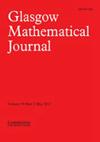The nonclassical diffusion equations with time-dependent memory kernels and a new class of nonlinearities
IF 0.4
4区 数学
Q3 MATHEMATICS
引用次数: 2
Abstract
Abstract In this study, we consider the nonclassical diffusion equations with time-dependent memory kernels \begin{equation*} u_{t} - \Delta u_t - \Delta u - \int_0^\infty k^{\prime}_{t}(s) \Delta u(t-s) ds + f( u) = g \end{equation*} on a bounded domain $\Omega \subset \mathbb{R}^N,\, N\geq 3$ . Firstly, we study the existence and uniqueness of weak solutions and then, we investigate the existence of the time-dependent global attractors $\mathcal{A}=\{A_t\}_{t\in\mathbb{R}}$ in $H_0^1(\Omega)\times L^2_{\mu_t}(\mathbb{R}^+,H_0^1(\Omega))$ . Finally, we prove that the asymptotic dynamics of our problem, when $k_t$ approaches a multiple $m\delta_0$ of the Dirac mass at zero as $t\to \infty$ , is close to the one of its formal limit \begin{equation*}u_{t} - \Delta u_{t} - (1+m)\Delta u + f( u) = g. \end{equation*} The main novelty of our results is that no restriction on the upper growth of the nonlinearity is imposed and the memory kernel $k_t(\!\cdot\!)$ depends on time, which allows for instance to describe the dynamics of aging materials.具有时变记忆核的非经典扩散方程及一类新的非线性
摘要在本研究中,我们考虑了在有界域$\Omega\subet\mathbb{R}^N,\,N\geq3$上具有含时记忆核的非经典扩散方程。首先,我们研究弱解的存在性和唯一性,然后,我们研究了在$H_0^1(\Omega)\times L^2_{\mu_t}(\mathbb{R}^+,H_0^1)$中含时全局吸引子$\mathcal{A}=\{A_t\}_{t\ in\mathbb{R}}$的存在性。最后,我们证明了当$k_t$接近零处Dirac质量的倍数$m\delta_0$为$t\t\infty$时,我们问题的渐近动力学,接近其形式极限\ begin{equation*}u_{t}-\Delta u_{t}-(1+m)\ Delta u+f(u)=g。\ end{equation*}我们的结果的主要新颖之处在于,没有对非线性的上限增长施加限制,并且内存内核$k_t(\!\cdot\!)$取决于时间,这允许例如描述老化材料的动力学。
本文章由计算机程序翻译,如有差异,请以英文原文为准。
求助全文
约1分钟内获得全文
求助全文
来源期刊
CiteScore
1.10
自引率
0.00%
发文量
36
审稿时长
6-12 weeks
期刊介绍:
Glasgow Mathematical Journal publishes original research papers in any branch of pure and applied mathematics. An international journal, its policy is to feature a wide variety of research areas, which in recent issues have included ring theory, group theory, functional analysis, combinatorics, differential equations, differential geometry, number theory, algebraic topology, and the application of such methods in applied mathematics.
The journal has a web-based submission system for articles. For details of how to to upload your paper see GMJ - Online Submission Guidelines or go directly to the submission site.

 求助内容:
求助内容: 应助结果提醒方式:
应助结果提醒方式:


